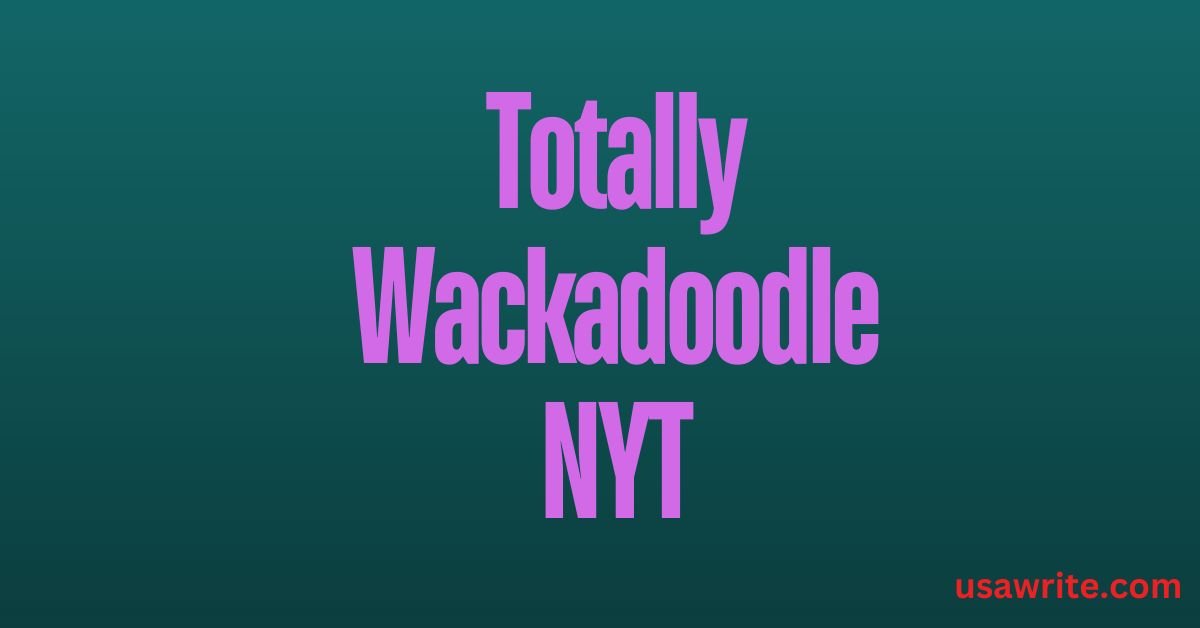Introduction to the Totally Wackadoodle NYT
Welcome, fellow media mavens and news enthusiasts! Today, we’re diving headfirst into the wild world of journalism with a spotlight on the Totally Wackadoodle New York Times.
Buckle up as we unravel the buzz surrounding this unconventional approach to news reporting that’s got everyone talking. Whether you’re a seasoned news junkie or just curious about the latest media trends, this is a ride you won’t want to miss! Let’s get started and uncover what all the fuss is about.
Response from the New York Times
The New York Times they responded swiftly to the Totally Wackadoodle NYT by denouncing it as a parody site spreading misinformation. They emphasized their commitment to journalistic integrity and accuracy, stating that such satire undermines trust in credible news sources.
The NYT’s response highlighted the importance of fact-checking and responsible reporting in today’s media landscape.
Furthermore, they addressed concerns about readers potentially confusing the two sites, reiterating that the Totally Wackadoodle NYT is not affiliated with them. Other news outlets also chimed in, echoing similar sentiments and urging caution when consuming online content.
In an era of rampant fake news and disinformation, maintaining high standards of journalism is crucial for preserving public trust.
The New York Times’ response serves as a reminder of the need for vigilance and critical thinking when navigating the vast sea of online information.
Impact on Journalism and Media
The Totally Wackadoodle NYT has brought a whirlwind of attention to journalism and media circles. Its outlandish headlines and controversial content have sparked debates on the boundaries of news reporting.
Some argue that it undermines the credibility of traditional journalism, while others see it as a reflection of our society’s appetite for sensationalism.
Media outlets have been forced to adapt to this new wave of extreme storytelling. The line between fact and fiction is becoming increasingly blurred, raising concerns about the impact on public discourse and trust in news sources.
As journalists strive to maintain their integrity amidst the noise created by sites like Totally Wackadoodle NYT, there is a growing emphasis on fact-checking and responsible reporting.
This shift highlights the importance of upholding ethical standards in an era where misinformation spreads like wildfire.
In navigating this evolving landscape, media professionals are challenged to uphold truth and accuracy while engaging audiences in a rapidly changing digital age.
Response from NYT and Other News Outlets
The response from the New York Times and other news outlets regarding the Totally Wackadoodle NYT has been mixed. While some have condemned the publication for spreading misinformation, others have defended it as a satirical take on current events.
The NYT issued a statement emphasizing their commitment to accurate reporting and distancing themselves from the parody site.
In light of this situation, many media organizations are reevaluating their fact-checking processes to ensure that similar incidents do not occur in the future. Maintaining credibility and trust with readers is paramount in today’s fast-paced digital landscape, where fake news can spread like wildfire.
As discussions continue within journalistic circles about how to combat disinformation, it remains crucial for both journalists and readers alike to critically evaluate sources and verify information before sharing it.
In an era where anyone can create content online, discerning truth from fiction has never been more critical.
Importance of Fact-Checking in Today’s Media Landscape
- In today’s fast-paced media landscape, the importance of fact-checking cannot be overstated. With misinformation and fake news spreading like wildfire across social media platforms, journalists and news outlets must uphold the highest standards of accuracy and credibility.
- Fact-checking safeguards against the dissemination of false information that can mislead the public and erode trust in journalism. Media organizations can maintain their integrity and reputation by verifying sources, confirming facts, and corroborating details before publishing a story.
- In an era where sensationalism often trumps truthfulness, fact-checking is a necessary counterbalance. It ensures that stories are grounded in reality rather than speculation or bias.
- As consumers of news content, we must also play our part by critically evaluating the information we come across online. Fact-checking empowers us to make informed decisions based on reliable sources rather than succumbing to misleading narratives.
Conclusion
As we reach the end of this article, it’s time to reflect on the whirlwind journey we’ve taken through media and journalism. The intricacies of fact-checking and the evolving landscape of news consumption have been laid bare before us.
It’s fascinating to see how one seemingly insignificant event can spark a chain reaction that reverberates throughout the industry.
The New York Times’ response to recent events has shed light on its commitment to upholding journalistic integrity in an era fraught with misinformation and fake news.
The buzz surrounding the Totally Wackadoodle NYT has undoubtedly stirred up conversations about credibility, responsibility, and trustworthiness in media outlets worldwide. It serves as a reminder that now, more than ever, discerning consumers must be vigilant in verifying information before accepting it as truth.
As we navigate this ever-changing media landscape, one thing remains clear: fact-checking is not just a trend but a necessity. In today’s fast-paced digital age, where information spreads like wildfire, distinguishing between real and fabricated is paramount.
So, let’s continue to question, investigate, and verify. Let’s challenge ourselves to seek credible sources and hold our news providers accountable for accurate reporting.
As we move into uncharted territory, remember that knowledge is power – wield it wisely.
Latest post!
- Dealasty: Revolutionizing the Way We Shop Online
- Arcangel Height: How Tall Is the Latin Music Superstar?
- Malia Manocherian: A Journey of Inspiration and Success
- Tñacuache: An Insight into Its Behavior and Survival
- Signs Your Elderly Relative May Need Assisted Living
- Çeciir: A Comprehensive Guide to Its Impact and Uses





